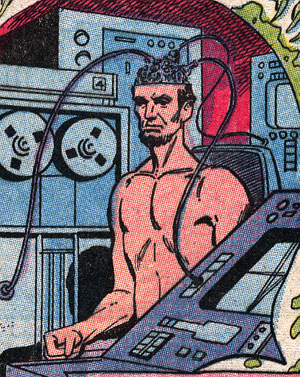"Claves of Steel" [mp3 removed]
The piano is a three note e-piano sample (heard at the very beginning) I trimmed from an LP of '70s breakbeats (thanks dave). I cut the sample up into stabs of three differing lengths and mapped each to a couple of octaves' pitch range. Then added compression and phasing and played it using MIDI to get some new tunes. Most of the notes are variations of the first few bars and unfortunately aren't as soulful as the original source (unless you like mutant 12-tone soul). The underlying beats are 4/4 techno with some FX and scratch samples. Also there are live drum hits under the original piano adding a kind of stop and start "breaks" feel to the rhythm. There's also some "house organ" in there.


